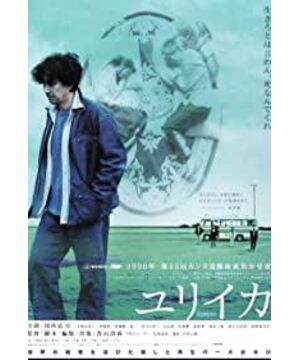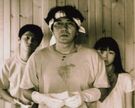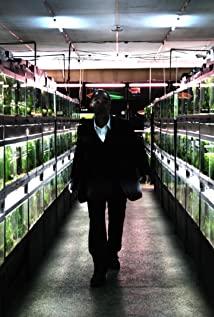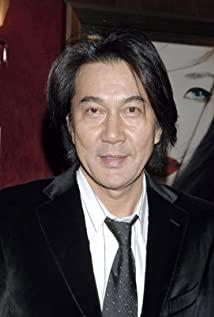I believe Soon, I am sure,
everything will go with the tide it will sweep us all away
overlooking the heaven and earth, the earth is heaven Eureka... 2000 ..
Story:
A middle-aged man Sincere prayers, finding the courage to continue the journey of survival, the story of "Artificial Paradise" is always on the road. When the bus homicide suddenly dropped, just like the indelible scars caused by natural disasters and sudden accidents - it is close to the meaning of the Hong Kong and Taiwan translation of "The Rest of the Catastrophe", but the latter is easily linked to "The Day After Tomorrow", The translation of American disaster films such as "The Clash of Heaven and Earth".
After the three survivors were hit by the tragedy, their souls could no longer find the way to return to their own bodies, wandering, anxious, and the nightmare changed their future life trajectory. Before, their lives were ordinary and plain, maybe, like An audience member watching a film in a movie theater is refreshed or lethargic.
They are haunted by the receding, surging tide of tragedy, preventing them from restoring the old balance of life. What prevented all this also included the children's parents leaving, and they could only rely on each other; Sakai Ma chose to self-exile and came back alone.
The first half of "Artificial Paradise" is a typical Japanese-style boring film, but it is closer to Japanese "modern scars" works in theme, such as human indifference, family crisis, communication barriers, social trauma, natural and man-made disasters, even in popular popular Idol, youth, and pure love films are also easy to capture themes. Hint: In the second part, there are key plots revealing that the memory
that affects the viewing effect of the film is regarded as a lonely and depressing film, and the common emotions of modern people are deepened, just because the characters in a tragic film were stalked a little miserably. In the aftermath of the bus kidnapping, the lives of several survivors came to an abrupt halt, with an indistinct two-year time span inserted in the middle, but which in turn represented the fact that time had stopped. Stopped time is boring and nothing changes.
One of the story points set in the middle of the "dreary film" is a serial murder case, and the added drama is understandable. But a thought flashed in my mind, the security in this place is really bad, it is kidnapping and murder, I think Aoyama Shinji overlooked one point in the screenwriter is why the serial murder case was after Masayoshi Sawai returned to the town It just happened, isn't this an intentional chisel mark? Several murders were placed intensively in time, and the absolute preference of ordinary people is to assume in their hearts that the protagonist is definitely not the murderer, unless Aoyama Shinji wants to create a Kurosawa Kiyoshi-style atmosphere of suspense, but that is obviously impossible. Perhaps there is not much excitement about the suspicion that several male characters have the identity of the murderer.
But no matter what, the clues of the serial murder case have continued to develop, and a surprising fact has been deduced. Looking back, the white sap when Naoki was slashing and slashing in the field has foreshadowed, and the waitress in the middle looks like a victim. Naoki panicked and vomited.
A screenwriter like Aoyama Shinji is like a car walking on a smooth and unobstructed highway, but it always needs a few bumps and jumps. This means two messages: the first is that the story is moving forward in the existing direction, and the second is to remind the passengers (audience) sitting in the car to interrupt the emotions. Or use a set of words to describe it as "the sense of tension and crisis that always exists in quietness and stability": on the one hand, it comes from the constant erosion and harm of shadows, the autism of Naoki brothers and sisters, and on the other hand, it is the emergence of another murder crime. , so that the real lung disease of Sawai also became serious.
What is the motivation and expectation to call the audience sitting in front of one screen to keep their feet and watch it in one breath without fast-forwarding or pausing. For movie theater audiences, qualifying means not falling asleep and leaving the table. The oppression of "Artificial Paradise" can only be relieved with the help of external lighting at night when there is no light, and then there is no intentional processing of almost black-and-white images in the daytime. There is no shortage of large-scale scheduling of shots, and it can also be described as delicate and delicate, but "Artificial Paradise" is still pressing and boring, which comes from the theme and the director's settings. They influence the mood of the film outside the screen, at least at first glance, it is concluded that the entire film has been filtered from beginning to end, and the sepiatone must be intentional, as if The gloom and nostalgia of old photos.
The ending changed as expected. A close-up of Miyazaki Aoi facing the camera, upgraded, Sakai really smiled and switched slowly. The condescending shooting point of view is actually the same as Tamura Masatoshi's swaying to the blue sky in "Cute Suzaku". If we have to say one meaning, it is from the perspective of heaven, saving souls and returning to ourselves.
Some Japanese fans have said that "Artificial Paradise" is a panning and long-lens route taken by Kenji Mizoguchi, Tatsumi Kamidai, and Shinji Ami, and of course, there are Western people like Angelopoulos of Greece. The places that can reflect the above intention include the large-scale deployment of moving long shots after the opening to show the police rushing to the scene of the robbery, and many times from the closed room to the open scene through the window to the outside of the house. The wonderful aftertaste of "Artificial Paradise" on the camera picture also comes from the night when the minibus is parked on the side of the road. At night, the shadows projected by the natural lights through the first floor windows have a great floating effect, and the details of the tap response are also impressive Quiet, which can be described as "the knock of the soul", is normal.
Memories at the end The
three and a half hours of black and white in "Artificial Paradise" before the ending was to wait for the colorful, bright and vivid eyes of Shuo (Aoi Miyazaki) to tell her the reason for living and the value of being alone. It turns out that there is still life in this world. There are green grass and a clear sky, but I didn't expect to hug or even go hand in hand, I just turned back to the minibus. The aerial camera circled around the top of Daguan Peak for a few weeks and then zoomed further and higher.
A full transition from a treated tan to a natural color, but is that just a happy ending? In fact, it is not. The conventional ending of personal conjecture is to talk about the end at the beach - there are indeed too many movies, even in Japan, there are a bunch of representatives of Takeshi Kitano. Not to mention that the sea is often the end of a French film and the beginning of a love story - back to where they started in the first place. The surging sea water, the cool tones, Piara and the Lido Island in his memory; the golden sunset, the distant shadows, the starting point for Ozong 5x2 men and women to meet.
I don't want Shinji Aoyama to actually let the two return to a high point in a valley with a wide field of vision. Why choose a mountain? The huge and continuous mountain system remnants divide the land into pieces of guarded and closed areas. Surrounded by mountains, the mountains have become a symbol of guarding the world, standing, blocking, encircling, and encircling.
And the mountains are tall and straight, and the sky is vast. Looking up, you can only see the sky with limited vision. There is order and restraint. This is a man-made paradise. Many people know the meaning of Eureka, from the ancient Greek story of Archimedes, who shouted "Eureka! Eureka!".
So Eureka means "I get it!", "I found it!", "I found it!", "I understand!" The clever thing is that the title of "Artificial Paradise" is similar to "My Life" without Me" and so on at the end, that is to say, after everything is over, the joyous words of Archimedes' discovery are written. But in addition to understanding the use of words, that low-level knowing smile, it is difficult for a few people to really be happy.
In addition, Japanese movie fans also use the slogan phrases with exclamation marks such as "the whole country must see it!" for the supported films; there are those who have been scolded by the commentary on "Artificial Paradise" in the newspaper and are in a serious mood; there are recommendations to go to the cinema It is extremely interesting to watch the experience-oriented audience who are completely intoxicated; but more of it is to praise how Hiroji Yasuo's acting skills are higher than others. It is extremely interesting.
On the whole, Shinji Aoyama's attempt in "Artificial Paradise" is indeed not out of the norm, but it must be admitted that it takes a lot of courage. The story of "Artificial Paradise" is closed, like the long wait for the shrinking flower bud to meet the bloom, like the dreadful desire to come back with encouragement. Aoyama Shinji spends a long time telling a story that requires courage to live - in today's opinion, a film of more than three and a half hours is to torture everyone's patience.
http://www.mtime.com/my/moviel/blog/383915/ (1)
http://www.mtime.com/my/moviel/blog/385089/ (2)
http://www.mtime. com/my/moviel/blog/386276/ (three)
View more about Eureka reviews











